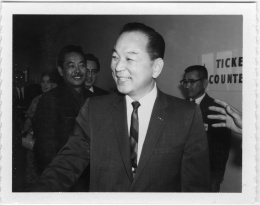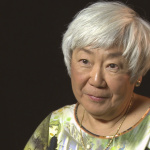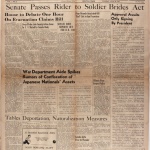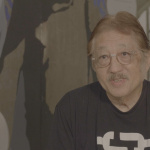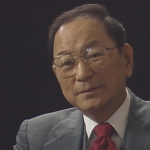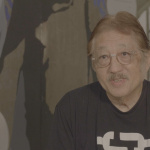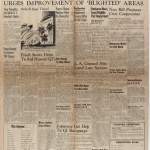Spark Matsunaga
| Name | Spark Masayuki Matsunaga |
|---|---|
| Born | October 9 1916 |
| Died | April 15 1990 |
| Generational Identifier |
Spark Masayuki Matsunaga (1916–90), a decorated World War II veteran, was known for his many accomplishments during his nearly four decades of public service first in the Territorial Legislature and later the United States Congress. He represented the state of Hawai'i in the House of Representatives and later the Senate and spearheaded efforts that led to the passage of the Civil Liberties Act of 1988 . He paved the way for other Asian Americans to be elected to Congress and was an important supporter of civil rights legislation, space exploration, renewable energy resources, and the establishment of peace institutes. [1]
Background and Military Experience
Matsunaga, a Representative and Senator from Kailua, Hawai'i, was born in Kukui'ula, Kaua'i on October 9, 1916, to immigrant plantation workers Kingoro and Chiyoro Matsunaga. As a child, he adopted the nickname "Spark" from a cartoon character, which he later legalized as his name. [2] He graduated from Kaua'i High School in 1933 and received a B.Ed. degree from the University of Hawai'i at Mānoa in 1941 and a J.D. degree from Harvard Law School in 1951. Matsunaga later pursued postgraduate studies at Northwestern University Traffic Institute in 1957 and at the Lawyers' Post-Graduate Clinics of Chicago in 1958.
Matsunaga was commissioned as a second lieutenant in the U.S. Army Reserve in June 1941 and volunteered for active service in the U.S. Army on July 1941. He served as an original member of the Nisei 100th Infantry Battalion Separate (later 1st Battalion 442nd Regimental Combat Team ). Matsunaga fought in North Africa and Europe and was twice wounded in battle. He also served as a company commander in the Military Intelligence Service . Matsunaga was released as captain on December 1945, and retired as a highly decorated lieutenant colonel, JAGC-USAR. After World War II, he worked as a veterans' counselor for the U.S. Department of the Interior until 1947 and later as a chief in the Priority Division of the War Assets Administration.
Matsunaga's Political Career
In 1948, Matsunaga married Helene Hatsumi Tokunaga and they had five children, Karen, Keene, Diane, Merle, and Matthew. [3] After graduating from law school, Matsunaga became an assistant public prosecutor in Honolulu, eventually entering private law practice. In 1954, he was elected to the Hawai'i Territorial Legislature as part of the Democratic Revolution of 1954 along with Daniel Inouye and George Ariyoshi and served as the House majority leader in 1959. In 1959, after Hawai'i had achieved statehood, Matsunaga lost his bid to become the state's first lieutenant governor. His loss in the primary election was the only defeat of his political career. Three years later, Matsunaga was elected as a Democrat to the 88th Congress, and was reelected six times until his election to the Senate on November 2, 1976, after defeating his friend and colleague Patsy Takemoto Mink. As a Representative, he was elected the president of the 88th Congress Club and served on the House Democratic Steering and Policy Committee and the Rules Committee. He was elected the chairman of the Subcommittee on Domestic Marketing and Consumer Relations (Committee on Agriculture) and of the Subcommittee of the Select Committee on Aging. Author Richard Halloran describes Matsunaga's efforts as a senator who worked tirelessly with his colleagues to effectively pass legislation:
Rather than confront an issue in public, Sparky preferred what the Japanese call nemawashi , which loosely translated means "tending the garden" or "thorough preparation;" he would go around to colleagues behind the scenes to explain what he wanted and to seek their support. When he was ready, he would make public his proposal with its support already lined up. [4]
As a longtime advocate for peace, Matsunaga lobbied for twenty-two years until he persuaded Congress to establish a U.S. Peace Institute in 1984. He also helped in the passage of the redress bill into law on August 19, 1988.
Civil Liberties Act of 1988
As a proponent for Asian American causes, Matsunaga along with Daniel Inouye introduced S. 1647, the Commission on Wartime Relocation and Internment of Civilians (CWRIC) Act on August 2, 1979, that led to the creation of the commission. The CWRIC conducted an official governmental study of Executive Order 9066, and in 1983 issued its findings in Personal Justice Denied . The findings revealed that the incarceration of Japanese Americans had not been justified by military necessity. Rather, the report determined that the decision to incarcerate was based on "race prejudice, war hysteria and a failure of political leadership." [5] In its findings, the commission recommended legislative remedies consisting of an official government apology, redress payments, and a public education fund to help ensure that this would not happen again.
Following the findings of the commission, Matsunaga was the main Senate sponsor of the Civil Liberties Act of 1988 that provided an official apology from President George H. Bush and $20,000 in redress to surviving Japanese Americans who had been incarcerated during World War II. Matsunaga is credited with "almost single-handedly" getting the legislation passed in the 100th Congress despite severe health problems, personally lobbying all ninety-nine senators at least once, talking to many about the legislation two to three times. [6] These lobbying efforts were particularly effective as Matsunaga was a decorated veteran of the 100th Battalion and 442nd Regimental Combat team and spoke about the importance of this legislation in addressing the incarceration of Japanese Americans during World War II. Matsunaga also held considerable power as the second-ranking Democrat on the Finance Committee, chair of its International Trade Subcommittee, and was the Chief Deputy Majority Whip. As Matsunaga was known as one of the hardest-working and most personable senators around, he was not one to ask for favors from his colleagues and it was difficult to turn him down. According to scholar Leslie T. Hatamiya, "Matsunaga's efforts cannot be overemphasized" as thanks to his efforts, the act ultimately had seventy-five cosponsors, an unheard-of number of major civil-rights legislation assuring its passage in the Senate, and preventing a possible filibuster. [7] Following the signing of this redress bill, Matsunaga shared his thoughts on this historic event:
To me, it was one of great gratification for hard work. And as one of Japanese ancestry, I felt that here was final recognition of our loyalty to the United States. Those of us who fought in the 100th Infantry Battalion, the 442nd Regimental Combat Team, and the Military Intelligence Service, we feel now that our efforts at the battlefront—giving up our lives and being wounded and maimed and disabled—all this was for a great cause, great ideals; that is to remove the one big blot on the Constitution that has been there for over 45 years. [8]
Matsunaga was also instrumental in the passage of other civil rights legislation such as the 1971 repeal of the Emergency Detention Act, Title II of the McCarran Internal Security Act of 1950 . [9] This act had authorized the President to apprehend and detain any person suspected as a threat to internal security during a national emergency. He also took up the cause of Iva Ikuko Toguri D'Aquino , known as "Tokyo Rose," who had been accused of treason during World War II and helped her receive a pardon from President Gerald R. Ford. [10] Matsunaga additionally sponsored bills relating to space exploration, renewable energy resources, and the establishment of the U.S. Institute for Peace in Washington D.C. After Matsunaga's passing on April 15, 1990, from cancer at the age of 73 while still in office, the Institute for Peace at the University of Hawai'i was renamed the Spark M. Matsunaga Institute for Peace. In 1999, the U.S. Treasury's Bureau of Public Debt also honored Matsunaga in a ceremony in Honolulu by featuring a portrait of him on its new $10,000 denomination Series I, inflation-indexed savings bond. In 2001, Matsunaga was memorialized in the naming of the Spark Matsunaga Elementary School in Germantown, MD, the first public school in the Washington D.C.-metropolitan area named after an Asian American.
For More Information
Chinen, Karleen. "Matsunaga VA Medical Center Nearing Completion." Hawaii Herald , February 19, 1990, A-5.
Chinen, Karleen and Reizo Watanabe. "U.S. Senator Spark Matsunaga," Hawaii Herald , October 7, 1988, 9.
Commission on Wartime Relocation and Internment of Civilians. Personal Justice Denied: Report of the Commission on Wartime Relocation and Internment of Civilians . Washington D.C.: Civil Liberties Public Education Fund; Seattle: University of Washington Press, 1997.
Halloran, Richard. Sparky: Warrior, Peacemaker, Poet, Patriot . Honolulu: Watermark Publishing, 2002.
Hatamiya, Leslie T. Righting a Wrong: Japanese Americans and the Passage of the Civil Liberties Act of 1988 . Stanford: Stanford University Press, 1993.
Hongo, Garrett. "Homage to Spark Matsunaga." Hawaii Herald , April 20, 1990: A-10-11.
Izumi, Masumi. "Prohibiting 'American Concentration Camps': Repeal of the Emergency Detention Act and the Public Historical Memory of Japanese American Internment." The Pacific Historical Review 74:2 (May 2005): 165-193.
Lum, Steve. "Spark Matsunaga." Hawaii Herald , October 5, 2007, C-16.
Matsunaga Institute for Peace & Conflict Resolution. http://www.peaceinstitute.hawaii.edu/ .
Matsunaga, Spark M. The Mars Project: Journeys Beyond the Cold War . New York: Hill and Wang, 1986.
Matsunaga, Spark M. and Ping Chen. Rulemakers of the House . Urbana: University of Illinois Press, 1978.
Memorial Services Held in the Senate and House of Representatives of the United States Together with Tributes Presented in Eulogy of Spark M. Matsunaga, Late a Senator From Hawaii . Washington D.C.: U.S. Government Printing Office, 1992.
Murray, Alice Yang. Historical Memories of the Japanese American Internment and the Struggle for Redress . Stanford: Stanford University Press, 2008.
"Spark Masayuki Matsunaga." In Biographical Directory of the United States Congress . http://bioguide.congress.gov/scripts/biodisplay.pl?index=M000250 .
Footnotes
- ↑ Research for this article was supported by a grant from the Hawai‘i Council for the Humanities .
- ↑ Steve Lum, "Spark Matsunaga," Hawaii Herald , October 5, 2007, C-16.
- ↑ Memorial Services Held in the Senate and House of Representatives of the United States Together with Tributes Presented in Eulogy of Spark M. Matsunaga, Late a Senator From Hawaii (Washington D.C.: U.S. Government Printing Office, 1992), VII.
- ↑ Richard Halloran, Sparky: Warrior, Peacemaker, Poet, Patriot (Honolulu: Watermark Publishing, 2002), 3.
- ↑ Commission on Wartime Relocation and Internment of Civilians, Personal Justice Denied: Report of the Commission on Wartime Relocation and Internment of Civilians (Washington D.C.: Civil Liberties Public Education Fund; Seattle: University of Washington Press, 1997), 18.
- ↑ Leslie T. Hatamiya, Righting a Wrong: Japanese Americans and the Passage of the Civil Liberties Act of 1988 (Stanford: Stanford University Press, 1993), 112; Alice Yang Murray, Historical Memories of the Japanese American Internment and the Struggle for Redress (Stanford: Stanford University Press, 2008), 371.
- ↑ Hatamiya, Righting a Wrong , 113.
- ↑ Karleen Chinen and Reizo Watanabe, "U.S. Senator Spark Matsunaga," Hawaii Herald , October 7, 1988, 9.
- ↑ Masumi Izumi, "Prohibiting 'American Concentration Camps': Repeal of the Emergency Detention Act and the Public Historical Memory of Japanese American Internment," The Pacific Historical Review 74.2 (May 2005), 178.
- ↑ Halloran, Sparky , 131.
Last updated June 10, 2015, 1:12 a.m..

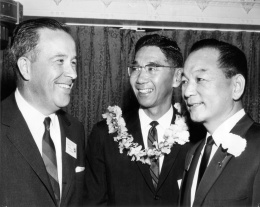 Media
Media
